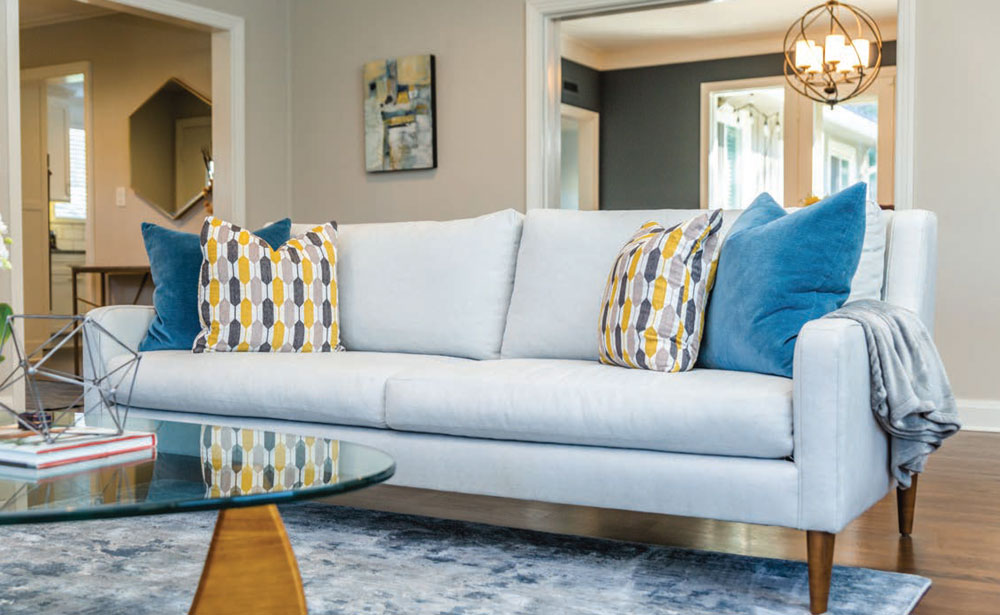Designing a home is more than just adding a collection of elements you love. For the best look overall, it’s important to consider how all the pieces work together and the story they tell.
Creating a cohesive theme throughout your home might seem daunting with so many styles, colours, and textures to choose from. With a few subtle design elements though, you can tie it all together. Imagine your home as a canvas, where each brushstroke – or room – comes together to create a beautiful picture. By focusing on the details you can ensure that nothing feels out of place.
Whether you’re a seasoned decorator or just starting with interior design, these tips will help you design a cohesive home theme with subtle details in every corner. Let’s get started.
Finding flow with foundational elements
Look at the floors and walls of your home as the blank canvas of your design. Choosing the right flooring and wall finishes helps set the mood of your home. Consider using the same flooring throughout your home, with subtle differences in colour or pattern to add interest or define spaces. For example, lighter wood floors can open up living spaces, while darker tones bring cosiness to a bedroom or study.
Walls offer a canvas for creativity. A consistent colour palette or particular wallpaper pattern can tie different areas together. Even the finish of the paint can play a role. Matte surfaces give off a soft, contemporary feel, while a satin finish creates elegance.
The dance of light and shadow
Part of setting the foundations for your space is getting the lighting right. Natural and artificial lighting both help bring your design to life, so treat them as part of your interior design. With the right lighting, you can highlight textures, enhance colours, and create a certain mood for your room that shifts throughout the day.
Making use of natural light can make spaces feel bigger and more open. Take a look at where your windows are and arrange the furniture to make the most of them. A big couch or cabinet will block the natural light from entering the room. Lighter-coloured furniture can brighten a room, making the most of the daylight, while darker tones create a contrast that adds depth and interest.
Artificial lighting can also transform your home design, giving it depth and connecting your spaces. Soft, diffused lighting can smooth out textures and soften colours, making a room feel warm and welcoming. In contrast, direct or accent lighting can highlight features, such as the grain of wood look hybrid floors or the detail of textured wallpaper.
Weaving magic with colour and texture
Colour and texture weave together to create a sense of harmony and flow throughout your home, allowing each room to tell a story while connecting it to the next. But how do you do it?
Start by selecting a colour scheme that reflects the mood you want to set. For a calming look, choose colours that complement each other. To create some energy, opt for contrasting colours that really pop.
Next, start to play with texture, which will add depth and interest to your spaces. When mixing textures, balance is key. For example, lay down a plush shaggy rug to contrast with your smooth flooring. Or, complement the leather sofa with fluffy cushions or a comfy throw. By balancing out your textures, you’ll always have a space that feels cohesive.
Embracing character with furniture and accessories
Now for the fun part – adding your chosen furniture and accessories to bring your rooms to life and show off your personality. It’s time to bring your painting together!
First, make sure your furniture fits the room. For example, a large sofa can overwhelm a small room, while a slimmer design allows natural light to flow around it and opens up space. Every piece of furniture should be clearly thought out and considered for how it adds to your room. Often, less is more.
Accessories are the perfect opportunity to add personality to your space. Art, cushions, throws, and rugs can tie in various elements of a room, through colour, design or texture. You can also use statement pieces to show off your style. A single oversized artwork or a unique piece of furniture can draw attention without taking away from the overall theme of your home.
Bringing it all together
By considering these subtle details, you can transform your home into a cohesive living space that reflects your style. Be sure to experiment with these tips and use them as an opportunity to express yourself. That way, you’ll create a space that feels uniquely yours. Whether you’re designing a single room or making over your entire home, here’s to creating a beautiful, cohesive theme that flows!

